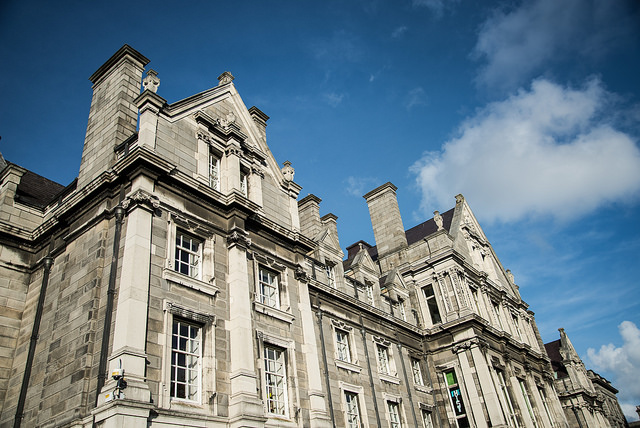
The second-to-last chamber debate of the calendar saw speakers tackle a weighty motion: ‘This House Would Choose to Believe in God’. Chaired by Dr Ruth Karras of Trinity’s department of history, the contested territory in this motion lay in reconciling the ideas of choice and faith – and neither side were going down easy.
Few would argue that the western world is on a secularising path, and so the proposition was somewhat on the back foot. To their credit, most of the speakers were keenly aware of this, and so the angles of attack taken by Seán Gordon Dalton were decidedly secular in nature.
Gordon Dalton announced with pride in his opening remarks that he is a staunch atheist. However, we should keep the concept of God alive, he suggested, as it provides us with a kind of moral glue which holds society together. In essence, he argued, it’s a good concept and we should choose it. A powerful rebuttal to this point was issued by Anna Kóllar for the opposition. Using epistemology, she argued that the concept is not fit for our limited human minds. The concept of deified perfection is by its definition beyond our comprehension, and as rational beings we cannot, and should not choose, to place faith in what we cannot comprehend.
“Comfort” was a term that came up time and again throughout the course of the debate. It was a central element of the arguments in favour of choosing faith at an individual level. Life is hard enough, proposition’s Stephen Ryan seemed to suggest, without having to accept that there is nothing at the end of it. God is a malleable concept (as Ailbhe Noonan for the opposition argued), so you should just believe whatever makes your life easier. To Ryan, God amounted to the denial of oblivion. “It makes my life easier” he stated, “so what can be wrong about that?”.
On the other hand, Bernard Byrne for the opposition honed in on the meaning that can be found in struggle without the requirement of some cosmic explanation. There was a deeply personal air to these arguments, and they honed in on the important point that happiness doesn’t always require rational explanation. Human beings, after all, are deeply irrational creatures, clawing about for meaning wherever we can find it.
The most exciting moments in the debate came at the end of the formal arguments. Chair Karras opened up the debate to the floor – giving any audience member an opportunity to speak for four minutes for either side. The two speakers who took up this offer spoke for the opposition and their passion was welcome. “Why would we choose to believe in a God that has no mercy?”, a speaker named Lucy demanded of the chamber in the most powerful moment of the evening. If life is a struggle, is it really made easier by believing that some conscious deity is causing all of the mindless injustice we see in the world today?
Karras closed off the evening with her own perspective on the matter. She meditated on the nature of choice in belief. To a certain extent, formalised religions were established in order to surmount the need for choice, she explained. In ancient Egypt, the word for choice also meant heresy. She noted the fact that it might involve a choice to assent to a moral order, but once that choice has been made free will is by definition taken out of the equation, and this is faith.
The motion was ultimately defeated, and we could return to the safe, godless, confines of our own thoughts. Yet, there was a sense of an odyssey having taken place in the chamber, where the speakers unravelled and challenged the nuts and bolts of our world views. When your fundamental beliefs are dissected in this way, even when their shape is unchanged, their configuration is necessarily altered. For the chamber, it wasn’t enough to unseat secularism, but many will have left with the distinct feeling that God isn’t quite dead yet.






